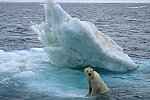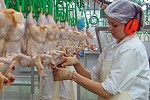 Shadows off the beaten path
Shadows off the beaten pathOUR DAILY BREAD | THE WORKSHOP
< < D O C S > >
last update 4.Feb.08
See also: SHADOWS FILM FESTIVAL
 R E V I E W B Y R I C H C L I N E
R E V I E W B Y R I C H C L I N E
 Photographer Annie gave her sister, documentary-maker Barbara, unrestricted access for a year, and what emerges is a fascinating, surprisingly even-handed portrait that traces Annie's history and artistry over the years.
Photographer Annie gave her sister, documentary-maker Barbara, unrestricted access for a year, and what emerges is a fascinating, surprisingly even-handed portrait that traces Annie's history and artistry over the years.
Assembled for the PBS series American Masters, it's great to see this on a big screen simply because of Leibovitz's remarkable images. And dozens of them flash across the screen along with a wide array of interviews, archive film and behind-the-scenes footage of the photographer at work with famous subjects like George Clooney, Julia Roberts and Keira Knightley, including extended sequences featuring Kirsten Dunst, Mikhail Baryshnikov and Robert Downey Jr.
Most interesting, perhaps, is how the film delves behind some of Leibovitz's most iconic images. Ono talks about the indelible portrait of her and John Lennon, snapped just hours before his death; Moore discusses that infamous Vanity Fair cover; Goldberg laughs about being submerged in milk. And as the film journeys back through Leibovitz's history at Rolling Stone in the 1960s and 1970s, we hear from the likes of Jagger and Schwarzenegger about her style of working, plus telling interviews with editors and friends.
And the film becomes more than just a list of her achievements. It's unafraid to dig in to Leibovitz's obsessive methods and extravagant budgets, and there's also an emotional streak as the film examines her strong family bond. The photos of her parents, siblings, children and especially long-time partner Susan Sontag are powerfully moving, as they reveal her singular skill in capturing the deepest humanity in her subjects.
Even she laughs off her over-the-top set-ups--like painting the Blues Brothers blue. But there's something else about her images that captures the imagination, and this gift was there back in her earliest photos, snapped when she was an army brat in the Philippines during the Vietnam War, through her hedonistic touring days with the Rolling Stones (of course followed by a stint in rehab) to her shots of today's political leaders. This is an open, thoughtful and frank documentary, and besides its revealing sketch of Leibovitz it also says something important about pop culture and the commercialisation of art. Especially as the photographer is now almost as famous as the people she photographs.
with Annie Leibovitz, Yoko Ono, Demi Moore, Bette Midler, Whoopi Goldberg, Mick Jagger, Arnold Schwarzenegger, Gloria Steinem, Hillary Clinton, Jann Wenner, Anna Wintour, Graydon Carter

release US 3.Jan.07,
UK 15.Feb.08
06/US Fortissimo 1h30

28.Nov.07
 R E V I E W B Y R I C H C L I N E
R E V I E W B Y R I C H C L I N E
 Over six years, husband-wife filmmakers Ravetch and Robertson collected some seriously amazing footage of life in the Artic, although the attempt to turn it into a cute narrative is a little forced.
Over six years, husband-wife filmmakers Ravetch and Robertson collected some seriously amazing footage of life in the Artic, although the attempt to turn it into a cute narrative is a little forced.
The story, narrated with plenty of sass by Latifah, follows two youngsters through their early years. Polar bear cub Nanu is taught how to hunt and swim by her mother, while her little brother struggles to keep up; baby walrus Seela is guided in the ways of the clan by her mother and an awfully brave "auntie". Being such a punishing landscape, we know not all of these characters will survive, especially as global warming causes severe changes to their habitat.
The footage itself is gorgeous, as we can't begin to imagine what the filmmakers went through while shooting in such an icy place, especially when they're underwater. Intimate scenes of life among the bears and walruses, plus a few other critters, are beautifully filmed with an attention to telling detail. And it's sharply edited together to create the parallel tales of Nanu and Seela, and also to suggest interrelationships between various animals.
But it goes far beyond suggestion. The anthropomorphism is shameless, giving the central animals vivid personalities, thoughts and even dreams, while on the soundtrack we get musical montages to such hackneyed songs as Celebration and We Are Family. Meanwhile, the grisly realities of life are severely underplayed. Despite the fact that polar bears survive by eating anything that moves, including their children, we only see one killing, and even that is almost out of view. The filmmakers probably thought the truth would be too upsetting for children, so we get walrus farts instead.
We also get a slightly heavy handed message in the end about how human activity is endangering the lives of Arctic animals. Yes, this is an important part of the story, and a genuinely urgent environmental message that's clearly close to cowriter Gore's heart (she's Al's daughter after all). But it feels a little forced in the context of a documentary that's played mostly for laughs or heartwarming family sentiment.
scr Linda Woolverton, Mose Richards, Kristin Gore
narr Queen Latifah
 release US 25.Jul.07,
release US 25.Jul.07,UK 8.Feb.08
07/US National Geographic 1h26
18.Jan.08
 R E V I E W B Y R I C H C L I N E
R E V I E W B Y R I C H C L I N E Unser Täglich Brot
Unser Täglich Brot
 Without any narration at all, this artful documentary examines the mass-production of food with telling detail. Skilfully crafted, it often feels like a sci-fi thriller or an animal-rights horror film.
Without any narration at all, this artful documentary examines the mass-production of food with telling detail. Skilfully crafted, it often feels like a sci-fi thriller or an animal-rights horror film.
Pristine camerawork captures each scenario with subtle wit, looking at the technology used to supply large quantities of meat and vegetables. There are three main areas we watch: cultivation, harvesting and packaging of various kinds of plants in greenhouses and fields; growth, slaughter and preparation of each kind of meat; and the workers themselves, both on and off the assembly lines. The result is both riveting and unnerving.
The animal sequences are the most upsetting, due to their overpowering inhumanity. These cows, pigs, chickens and fish are living creatures, yet they're handled like inanimate objects by people and machines, kept in dark storage rooms, conveyed on belts and hooks, then chopped and sliced as needed. We also see the insemination process for both pigs and cows (the poor bulls look confused, but it's the workers we feel sorry for). And on the other side are impersonal hydroponic greenhouses or vast fields tended by machines, even if much of the harvesting is done by hand.
And the work itself seems dull and dehumanising. We watch these people, bored and chomping on gum as they, say, clip off pigs' hooves, then head to the cafeteria for a sandwich. One guy gets a call on his mobile phone while he's sawing a cow carcass in two. We see them tending after baby chicks and piglets, driving the machines, manning their stations along the assembly line and even bringing their home cultures into the frame.
It's beautifully shot in long takes with clever revelations, micro-details and a sense of the huge scale. Without words or music, the superb sound mix highlights the neverending hum of machinery. It's like a behind the scenes tour of our everyday life--fascinating, revealing, mesmerising and terrifying as it exposes the arrogance of man, that other creatures don't deserve dignity because they're just food. But is this cruel exploitation of land and animals or what's needed for human survival? That's the question that sticks in our minds.
scr Nikolaus Geyrhalter, Wolfgang Widerhofer
with Claus Hansen Petz, Arkadiusz Rydellek, Barbara Hinz, Renata Wypchlo, Alina Wiktorska, Ela Kozlowska, Anna Bethke, Malgorzata Nowak, Halina Kosiacka, Tibor Korom, András Szarvas, Lies Jacobs
 release Aut 21.Apr.06,
release Aut 21.Apr.06, US 23.Nov.06,
UK 25.Jan.08
06/Austria 1h32

21.Jan.08
 R E V I E W B Y R I C H C L I N E
R E V I E W B Y R I C H C L I N E
 Going undercover into a self-actualisation retreat is a terrific idea for a documentary, as Morgan digs into the philosophies and goings-on. But his participation feels half-baked at best, and this undermines the whole film.
Going undercover into a self-actualisation retreat is a terrific idea for a documentary, as Morgan digs into the philosophies and goings-on. But his participation feels half-baked at best, and this undermines the whole film.
British expat Paul Lowe (age 72) runs 10-day workshops in the woods outside San Francisco. The purpose is to push people to rid themselves of the trappings of society to find themselves beyond the labels. This involves rather a lot of nakedness, figuratively and literally, plus sexual exploration and opening the mind to things we've been told are unthinkable, such as the existence of aliens. Morgan's camera follows four London-based participants, getting involved in personal dramas and adding a one-year-later coda.
When he's examining Lowe's ideas and methods, the film is riveting, springing from Socrates' observation that "the unexamined life is not worth living". Lowe challenges participants to overcome every layer of fear in their lives, including cultural inhibitions such as clothing and monogamy, to genuinely look at and change behaviour. Sexual energy is clearly a big theme, and much of the time is spent exploring ways to avoid bottling it up. Lowe's theory is that freeing repressed sexual energy is the key to personal freedom.
Of course, this opens several cans of worms. As a couple, Ryan (29) and Maddy (30) struggle with jealousy when Laurel (30) breaks into their relationship. While Brian (28) feels left out of the romantic mayhem. They all talk about embracing non-monogamy, but are unable to really do so. Clearly for some participants these workshops are more about sex and escapism, rather than any real attempt to face life without fear. And then there's Morgan, who adds a running video diary in which he tries to examine his own feelings and reactions.
The problem is that Morgan just isn't very self-aware. His emotional breakdowns are edited to look like internal turmoil when they actually feel like play-acting. While his camera caresses the naked women and sometimes examines men as well, he never lets himself appear on screen nude, either figuratively or literally, and his final conclusions are a bunch of cliches that Lowe would laugh out of the room. In order to make this film work, he really either needed to stay completely on the sidelines or jump in with both feet.
with Jamie Morgan, Paul Lowe, Ryan, Maddy, Laurel, Brian, Ken, Flavin, Tod, Wilfred
 release US 25.Apr.07 tff,
release US 25.Apr.07 tff, UK Feb.08
07/UK 1h33
TRIBECA FILM FEST
11.Dec.07


See also: SHADOWS FILM FESTIVAL | SHORT FILMS
© 2008 by Rich Cline, Shadows
on the Wall